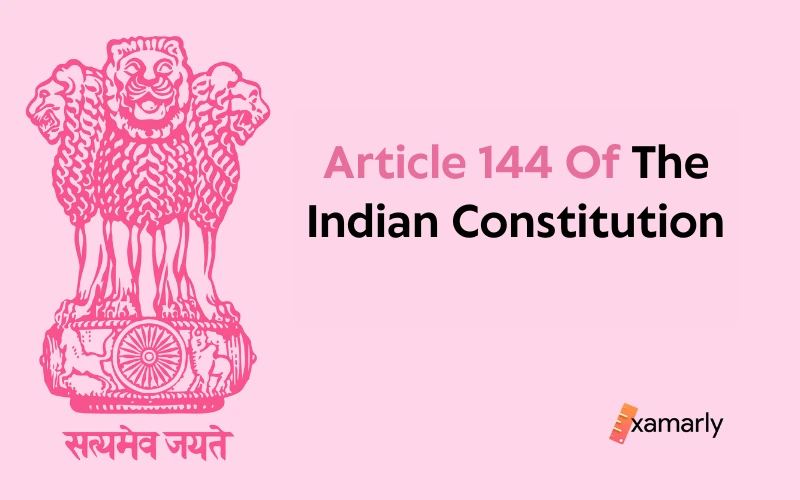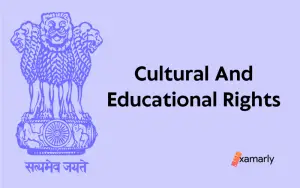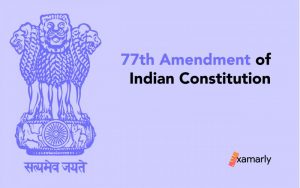Chapter IV of the Indian Constitution is dedicated to the Union Judiciary, which is where Article 144 of the Indian Constitution can be found. In the Indian Constitution, Article 144 addresses the duties that are placed on both the civil and judicial entities to provide assistance to the Supreme Court.
All civil and judicial entities in Indian territory have been ordered to support the Supreme Court. Article 144 of the Indian Constitution was discussed in the Constituent Assembly on May 27, 1949. At the time, it was known as Article 120 of the Draft Constitution. According to the Draft Constitution, all civil authorities must support the Supreme Court. Without discussion, the Assembly accepted the proposed Article on May 27, 1949.
What Is Article 144 Of The Indian Constitution?
According to the constitutional provisions of Article 144, the Supreme Court must receive assistance from all civil and judicial bodies operating within the boundaries of India.
Note:
Article 144A is inserted into the Constitution of India by the 42nd constitutional amendment act.
Article 144A contains Special provisions as to the disposal of questions relating to the constitutional validity of laws.
However 43rd Constitutional Amendment Act of 1977 omitted Article 144A from the Indian Constitution.
Civil Authorities
Military authority is never given the upper hand over civil authority.
The civil service is the organizational unit in charge of carrying out governmental functions in compliance with rules, laws, and moral standards while being directed and overseen by duly elected representatives of the people.
While performing their duties for the government, members of the civil service are tasked with carrying out the will of Parliament, as conveyed by the cabinet.
Their primary objective is to provide assistance to the government in the process of formulating policies and, following that, in the process of carrying out effective execution of these policies on the ground.
In accordance with Article 144 of the Indian Constitution, the Supreme Court of India aids civil authority.
Judicial Authorities
India’s judicial structure consists of the Supreme Court, District Courts or Subordinate Courts, High Courts, and Magistrate Courts. For all citizens to be treated fairly, the law must be interpreted by the judicial authority, and disputes must be resolved by the judicial authority. These authorities are responsible for maintaining democracy and safeguarding the Constitution. As per Article 144 of the Indian Constitution, the SC assists the judiciary in India.
Who Are The Judicial Authorities In Our Nation?
Judicial authorities include the following:
- The Chief Justice of India and of States
- The Judicial Council,
- Any prosecutor as well as court arbitrator,
- Special master,
- The tribunal, any other comparable body of any sort
- any court judge, and any governmental agency performing any judicial tasks or powers.
Case Laws
Smt.Rinki v. State Of Uttar Pradesh Thru Prin.Secondary. Higher Education. Lko and Ors (2019)
What Are The Facts Of This Case?: In this instance, it pertains to the honesty of some universities’ admissions to the B.Ed. program for the academic year 2013–2014 as well as the concealment of the exams taken by such students and the disclosure of their exam results. Numerous petitions were submitted in response to this problem. Rinki filed a lawsuit requesting that the administration of Chaudhary Charan Singh University, Meerut, be compelled to release her B.Ed. test results.
Issues Involved: How Article 144 of the Indian Constitution relates to this case is a matter that has to be addressed.
Court’s Judgement: When the Supreme Court was examining the decision that the High Court had made in regard to that petition, it made the observation that the High Court was required to address the essential questions that the Supreme Court was authorized to consider.
Article 144 of the Constitution specifies that all civil and judicial organizations must act in accordance with the good intentions of the Supreme Court, and the Supreme Court has recalled the High Court of this obligation.
Our judicial system’s hierarchical structure of court is significantly impacted by Article 144 in terms of maintenance and functioning.
The Supreme Court of India established a timetable for the admissions process and the publication of results for Bachelor of Education programs with reference to Articles 141 and 144 of the Indian Constitution. The time limit was established for the College of Professional Education and other organizations, however, those organizations should not be hesitant to adhere to the time limit because the power is only given to civil and judicial authorities. Within the predetermined timeline, results must be announced and students must be admitted to B.Ed courses. If not, it will become forbidden to do so.
Hoffmann Andreas v. Inspector Of Land Customs Station (2001)
Issues Involved: The petition inquires as to whether or not the Supreme Court has the authority to move the case to another court in the state of Punjab or in the city of Chandigarh that has appropriate jurisdiction over the matter.
Court’s Judgement: The Supreme Court agreed to let the witnesses be re-examined. Articles 141 and 144 of the Indian Constitution require lower courts to strictly abide by the Supreme Court’s decisions and instructions. The trial court allegedly disregarded the instructions, as per the Supreme Court. The petition was approved so that the matter could be transferred to the Special Judge of Jalandhar, who would preside over it from this point on until its conclusion. The Special Judge might then continue and deliver the ruling.
Conclusion
In accordance with Article 142 of the Constitution, the entire Indian subcontinent is obligated by the decisions and judgments of the Supreme Court.
In addition, Article 144 stipulates that judicial and civil bodies must support the Supreme Court.
In order to give effect to the Supreme Court’s directives and rulings, all civil and judicial authorities operating within the boundaries of India have been placed under its direct control insofar as they are necessary to “act in aid of the Supreme Court.”
If any civil or judicial authority does to comply with any directives issued by the Supreme Court, they could face contempt of court proceedings as well as punishment for their actions.
For Further Readings:
| Article 140 Of The Indian Constitution (Ancillary powers) | Article 118 Of The Indian Constitution (Rules of procedure Article) |
| Article 159 Of The Indian Constitution | Article 160 Of The Indian Constitution |
FAQs On Article 144
Which Amendment Has Amended Article 144?
By virtue of the 42nd constitutional amendment act, Article 144A is added to the Indian Constitution. Special provisions regarding the resolution of issues relating to the constitutional legitimacy of laws are contained in Article 144A. However, Article 144A was left out of the Indian Constitution by the 43rd Constitutional Amendment Act of 1977.
What Is Article 144 Of The Indian Constitution?
The Supreme Court is required to solicit assistance from all civil and judicial entities operating inside the borders of India under the constitutional provisions of Article 144. Therefore, no other authority may assert that power in exclusivity or in defiance of the Supreme Court’s decision under the terms of our constitutional scheme.
Who Are The Civil Authorities?
Different from religious authority (such as canon law) and secular authority, civil authority or civil government is the practical execution of a state on behalf of its inhabitants that maintains law and order. Examples of civil authority include police officers, members of the Indian Administrative Service (IAS), and railway officers who are required to wear uniforms. The police force in a modern state is tasked with maintaining order and enforcing the law. Civilian authority is always ruled supreme over military authority.
Who Are The Judicial Authorities?
The judicial authorities have the authority and the jurisdiction to make decisions, and they are also responsible for maintaining the law throughout the nation. For instance, Any tribunal, arbitrator, special master, receiver, court, or other comparable body of any sort, including any governmental authority having judicial powers or responsibilities of any nature, is referred to as a judicial authority.






